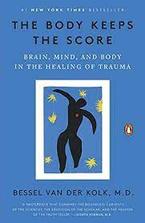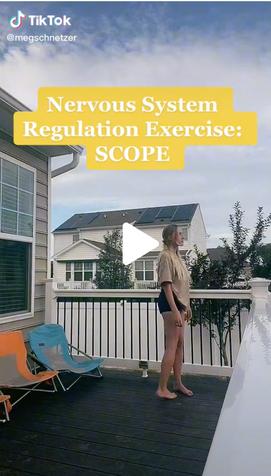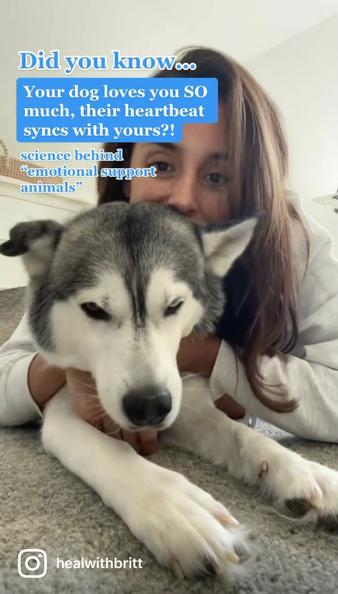TRAUMA RESPONSES TRAUMA RESPONSES AND TOOLS FOR AND TOOLS FOR REGULATION REGULATION





Welcome to your free Nervous System Guide, and perhaps for you it’s the beginning of your healing journey. First of all, thank you for being here and taking this brave first step. Healing can be messy and feel overwhelmingly confusing as you try to make your way back to yourself, but knowing how your body works can make that journey much easier to navigate.
This guide offers the basic understanding of your nervous system and the impact trauma has on it, as well as tools to support you in reconnecting with yourself. This may all seem very unfamiliar to you, and that’s ok (it was unfamiliar to us when we began as well). Allow yourself some compassion for what you do not yet know and take it at your own pace. We will walk you through it.

The Healing Hub is a diverse Trauma-Informed membership platform that offers Life Coaching, somatic tools, safe connection, and compassionate community. The Healing Hub team is a group of trauma informed practitioners specializing in somatic experiencing and trauma recovery. Our mission is to empower our clients and other survivors of trauma to know they aren’t alone, and the Healing Hub is where they can find hope and healing.
We know from first-hand experience that healing is not one size fits all. The complexity of trauma requires a complex response. This awareness has fueled our commitment to empowering our clients with a diverse set of modalities for growth. With this mission in mind, we have advanced qualifications in: complex trauma, nervous system regulation, somatic experiencing & attachment. We use our training and experiences to lead a monthly membership, share educational content for free via social media, and offer private and group coaching programs throughout the year. You can learn more about our team, apply to work with us and find more information at myhealinghub.com.

First, let’s establish an understanding of what the nervous system is. The nervous system is a very sophisticated network of nerve tissues in the body that operates with the intention of ensuring your survival. It is responsible for all your voluntary actions, such as intentional movement, as well as your involuntary actions, like breathing and heartbeat. It is essentially the electrical wiring of your body. It is composed of nerves and neurons that transmit information throughout the body, and are responsible for the communication between the body and the brain. Of this communication, 80% of the neurons take information from the body to the brain, and 20% take information from the brain to the body, via the vagus nerve. This is to say that the nervous system operates on a predominantly bottom-up approach. Bottom line: the ancient wisdom of the body will always trump our thoughts.


There are two branches of the autonomic nervous system that we refer to as the sympathetic branch (activation) and the parasympathetic branch (rest and relaxation). A well regulated nervous system is able to balance a harmonious rhythm between these two branches as it navigates the world for survival. However, trauma will disrupt this rhythm and leave your system feeling “stuck”.
Perhaps you have heard the phrase, “The Body Keeps the Score” and that couldn’t be more true. When the body has detected that it is unsafe and must act to get safe, rational thought, reasoning, speech, explicit memory, and other higher-order functioning goes offline, because they are not essential for survival. The reptilian and mammalian parts of the brain are firing to get you to safety. Herein lies implicit memory - the memory of the body. Your body remembers what it did to survive and what it felt in the trauma to protect itself in the future. It then operates from a survival state moving forward.


"The Body Keeps the Score" is also the title of one of our favorite books to recommend to people just starting out in their healing journey! By:
 Bessel Van Der Kolk, M.D.
Bessel Van Der Kolk, M.D.
Think of your Nervous System as a Think of your Nervous System as a ladder. A healthy & regulated ladder. A healthy & regulated system will go up and down this system will go up and down this ladder between your three states ladder between your three states throughout the day. throughout the day.
VENTRAL
Vagal (Parasympathetic) – Vagal (Parasympathetic) – Our ventral state is Our ventral state is where we experience both safety and connection. In daily where we experience both safety and connection. In daily function, this is the state where we find ourselves existing function, this is the state where we find ourselves existing in healthy homeostasis, ready to engage, socialize, and in healthy homeostasis, ready to engage, socialize, and connect with others, the world around us, and ourselves. connect with others, the world around us, and ourselves.
Examples of behaviors and emotions in Vagal: Examples of behaviors and emotions in Vagal: connection connection to yourself and others, safety, resourced and resourceful, to yourself and others, safety, resourced and resourceful, creativity, open-mindedness, social, engaged creativity, open-mindedness, social, engaged
SYMPATHETIC SYMPATHETIC –– Our sympathetic state is a state of Our sympathetic state is a state of mobilization where we experience the protective mobilization where we experience the protective responses of fight and flight. When someone experiences a responses of fight and flight. When someone experiences a trigger and the survival responses are activated, the trigger and the survival responses are activated, the nervous system will employ adaptive protection through nervous system will employ adaptive protection through action: aggression (flight) or active escape (flight). action: aggression (flight) or active escape (flight).
Examples of behaviors and emotions in Sympathetic: Examples of behaviors and emotions in Sympathetic: anxious, hypervigilant, irritable, angry, high energy, over- anxious, hypervigilant, irritable, angry, high energy, overproductivity, perfectionism, lashing out productivity, perfectionism, lashing out
DORSAL DORSAL Vagal (Parasympathetic) – Vagal (Parasympathetic) – Our dorsal state is a Our dorsal state is a state of immobilization where we experience state of immobilization where we experience disconnection and shut down. In this state, our nervous disconnection and shut down. In this state, our nervous system protects us by conserving energy and resources. As system protects us by conserving energy and resources. As a result, we disconnect from others, the world around us, a result, we disconnect from others, the world around us, and ourselves. and ourselves.
Examples of behaviors and emotions in Dorsal: Examples of behaviors and emotions in Dorsal: zoning zoning out, dissociating, numbness, low energy, exhaustion, out, dissociating, numbness, low energy, exhaustion, feeling foggy or out of it, disconnection from yourself and feeling foggy or out of it, disconnection from yourself and others, feeling invisible others, feeling invisible
Trauma is any experience that overwhelms our capacity to cope. It is anything that is too much, too little too soon, or too fast.
From the famous words of Dr. Gabor Mate, “Trauma is not what happens to you, trauma is what happens inside of you, as a result of what happened to you."
When we experience a traumatic event, the autonomic nervous system can get stuck in a state of dysregulation. The body’s response to trauma can show up in a few different ways. Next we will share the different trauma responses we can experience in the body and a few tools that can support your nervous system in coming back into regulation; otherwise known as your “range of resiliency.”


–
Sympathetic / Fight or Flight –

When you are experiencing a trauma response or dysregulation in the When you are experiencing a trauma response or dysregulation in the sympathetic branch of your ANS, this can feel like being “stuck on ON.” This is sympathetic branch of your ANS, this can feel like being “stuck on ON.” This is because the sympathetic branch of your nervous system oversees mobilization. because the sympathetic branch of your nervous system oversees mobilization. When we are in a sympathetic state, our heart rate increases and we produce an When we are in a sympathetic state, our heart rate increases and we produce an abundance of neurochemicals such as epinephrine, cortisol, dopamine, and ATHC abundance of neurochemicals such as epinephrine, cortisol, dopamine, and ATHC which increase our alertness and focus and assist us in escaping the perceived which increase our alertness and focus and assist us in escaping the perceived tthreat. hreat.
What it looks like: What it looks like: Being stuck in a state of fight or flight can make it seem difficult to slow down Being stuck in a state of fight or flight can make it seem difficult to slow down and rest. You may feel things like restlessness, anxiety, hypervigilance, and rest. You may feel things like restlessness, anxiety, hypervigilance, hyperactivity, worry, rage, anger, or increased irritability. hyperactivity, worry, rage, anger, or increased irritability.
Fawn or Appease (mixed state of flight and dorsal) –
Fawn or Appease (mixed state of flight and dorsal) –
The definition of the word “appease” is “active pacification to de-escalate a The definition of the word “appease” is “active pacification to de-escalate a threatening situation.” This trauma response is more common when the aggressor threatening situation.” This trauma response is more common when the aggressor or threat is someone you know or if the engagement of the fight or flight response or threat is someone you know or if the engagement of the fight or flight response could threaten your sense of safety and belonging within your family or could threaten your sense of safety and belonging within your family or community. community.
This response can look like doing or saying something that doesn’t align with your This response can look like doing or saying something that doesn’t align with your truth or values in order to de-escalate a situation that your nervous system truth or values in order to de-escalate a situation that your nervous system perceives to be dangerous or life-threatening. Other ways this response can show perceives to be dangerous or life-threatening. Other ways this response can show up are codependency, having lack of boundaries, or identifying as a people up are codependency, having lack of boundaries, or identifying as a people pleaser. pleaser.
High-tone dorsal is the trauma response that you experience when your fight or flight High-tone dorsal is the trauma response that you experience when your fight or flight response becomes inhibited. This part of your system is in charge of immobilization and can response becomes inhibited. This part of your system is in charge of immobilization and can feel like being stuck on "OFF." It aims to help you minimize the pain of what it perceives to feel like being stuck on "OFF." It aims to help you minimize the pain of what it perceives to be a life-threatening situation by numbing you and helping you disassociate from your be a life-threatening situation by numbing you and helping you disassociate from your body. This is a slower heart rate and low oxygen state where you release neurochemicals body. This is a slower heart rate and low oxygen state where you release neurochemicals such as GABA, dopamine, adenosine, and endorphins. such as GABA, dopamine, adenosine, and endorphins.
What it looks like: What it looks like:
In this state you may experience tonic immobility, shut down, collapse, disassociation, In this state you may experience tonic immobility, shut down, collapse, disassociation, depression, and shame. depression, and shame.

Freeze (Mixed state of sympathetic & dorsal) – Freeze (Mixed state of sympathetic & dorsal) –Freeze is a blended state. In the freeze trauma response, you experience equal parts Freeze is a blended state. In the freeze trauma response, you experience equal parts sympathetic energy and equal parts dorsal energy. sympathetic energy and equal parts dorsal energy.
What it looks like: What it looks like: This can feel like a combination of symptoms. For example, feeling anxious and stuck at the This can feel like a combination of symptoms. For example, feeling anxious and stuck at the same time. Feeling like a “deer in the headlights” or shutting down when experiencing high same time. Feeling like a “deer in the headlights” or shutting down when experiencing high amounts of arousal or overwhelm. amounts of arousal or overwhelm.
NOTE: NOTE: It is both possible and common to experience multiple nervous system states and It is both possible and common to experience multiple nervous system states and trauma responses at once. While everyone has one nervous system that they frequent more trauma responses at once. While everyone has one nervous system that they frequent more than others, these states exist on a continuum and you are never completely in one state at than others, these states exist on a continuum and you are never completely in one state at any given time. any given time.
Which nervous system state or states do you feel like you are stuck in? What does it look like for you to be in survival mode? Take a moment to reflect on the physical and emotional signs of being dysregulated for you so you can become aware.
Remember,thegoalisnottoavoid feelingnegativeemotions.Youhaven’t failedifyouhaveahardday,orafew harddays.Thegoalistobeabletolet theseemotionscomeandgowithease; tonotattachtothemandletthemhold youdown.Awarenessiskeytobeing abletomoveintoACTIONanddothings thathelpyoutocomeoutofsurvival modeandgetbacktofeelinglike yourselfagain.Nextup,we’llgoover sometoolstousewhenyou'reinan activatedstate.
Vooing is designed to down-regulate your nervous system through the stimulation of the vagus nerve. Sitting or standing, softly bring your awareness to your breath. Slowly breathe in and on your exhale, make the sound “VOOOOOOO” for the length of a comfortable exhale. Release. Allow for your natural inhale and repeat again on your next exhale. Take notice of the vibration of this sound throughout your body. (This can be great when experiencing fight, flight, or freeze.)
Take a moment to orient yourself to your surroundings. Allow your gaze to gently wander in your space - taking in the colors, the lighting, the objects, the surface beneath you. Take notice of what feels pleasant to your body as you are orienting to your space. Rotating your head while your gaze wanders in this orienting practice can activate relaxation in your body as it takes note of safety in the present. (This can be great when experiencing the fight or flight response.)

Vooing -
Check out Jen's video on a Vooing Somatic Practice HERE !!


This somatic exercise created by Dr. Peter Levine is used to make vibrations through the vocal cords that help activate the vagus nerve.
Orienting -
Be sure to watch Meg's Nervous System Regulation TikTok HERE !!
Trauma is stored in the body so processing it in the body and understanding how to regulate your nervous system is a must.
This tool is mimicking the motion of soothing a baby. Either standing or sitting, This tool is mimicking the motion of soothing a baby. Either standing or sitting, anchor your feet (or bottom) to the ground with a gentle firmness. Slowly begin to anchor your feet (or bottom) to the ground with a gentle firmness. Slowly begin to sway your body, rhythmically, from side to side. Move at a pace that feels good to sway your body, rhythmically, from side to side. Move at a pace that feels good to you. If it feels comfortable to do so, place your hands on either upper arm, you. If it feels comfortable to do so, place your hands on either upper arm, embracing yourself in a compassionate hug as you sway. This can also be done in a embracing yourself in a compassionate hug as you sway. This can also be done in a rocking movement. Try out both and notice which your body finds more soothing. rocking movement. Try out both and notice which your body finds more soothing. (This can be great when experiencing (This can be great when experiencing freeze or high-tone dorsal. freeze or high-tone dorsal.))
When experiencing freeze or high-tone dorsal try inviting in some gentle When experiencing freeze or high-tone dorsal try inviting in some gentle movement that doesn’t feel too activating or overwhelming, like light swaying, movement that doesn’t feel too activating or overwhelming, like light swaying, rocking, or going for a walk. This supports your system in mobilizing away from the rocking, or going for a walk. This supports your system in mobilizing away from the state of collapse or shut down. If you start to feel more capacity to engage in state of collapse or shut down. If you start to feel more capacity to engage in further movement, you can try to invite in a gentle shake or bounce in your body to further movement, you can try to invite in a gentle shake or bounce in your body to help discharge some of the underlying sympathetic energy. help discharge some of the underlying sympathetic energy. (This can be great when experiencing (This can be great when experiencing freeze or high-tone dorsal. freeze or high-tone dorsal.))


This is the act of using the nervous systems of the people and/or This is the act of using the nervous systems of the people and/or animals animals around you to help bring your system into regulation. Engage around you to help bring your system into regulation. Engage in co-regulation with people or pets that your system registers as good in co-regulation with people or pets that your system registers as good or safe. (This can be great when experiencing or safe. (This can be great when experiencing fight, flight, or freeze. fight, flight, or freeze.))


Thank you for taking the time to explore this guide and learn more about selfregulation tools to come out of flight, fight or freeze states.
We hope this free resource gives you a simple yet effective place to start using somatic experiencing techniques. But as you can imagine, there’s so much more to learn and many more modalities to explore.
If you’d like to dive deeper into this work, here are a few ways you can join us at the Healing Hub…
Our membership is based on monthly themes that pertain to the healing journey. Members receive 1 workbook with 3+ exercises that exemplify healing modalities like we’ve shared in this guide, but with more specific applications for our daily life. We also host 2 calls with coaches each month for members to bring their questions and reflections and connect with other survivors. In addition, we also invite experts and guest speakers to share their knowledge with our community each month in a themed workshop. The expanding Healing Hub Vault provides 50+ educational videos, guided practices, resources, and step-by-step guides like: How to Set Boundaries, Creating a Trigger Plan, Relationship Red Flags, Emotional Regulation for Parents & Children...and more! If you enjoyed this guide, the membership is a great next step.
Join and cancel any time: https://www.myhealinghub.com/membership
This is our most popular and transformative offering: a 12-week 1-on-1 coaching program designed to regulate your Nervous System, somatically process past traumas, repair attachment/relationship wounds, and reintegrate pain to purpose. Each week we focus on a different area for healing, such as core wounds, inner child work, attachments and more. You’ll leave this program feeling empowered to process and heal your trauma. You’ll have a solid understanding of the science behind trauma, how it has been affecting your life and relationships, and the confidence to know that moving forward, you have the information and tools within you to handle whatever comes your way…FOR LIFE.
Apply to work with one of our coaches here: https://www.myhealinghub.com/privatecoaching
The Healing hub Immersive is our group coaching program designed to help you experience the profound impact of finding safety and healing in community. It is an 8-week healing program designed to support you through a trio of features: 1-on-1 coaching, group coaching AND support system coaching! It’s a great option for anyone who already has a solid foundation for their trauma recovery, but wants to invest in trauma informed education, community and the integration of this work into their life.
Sign up for the Immersive here: https://www.myhealinghub.com/immersive




